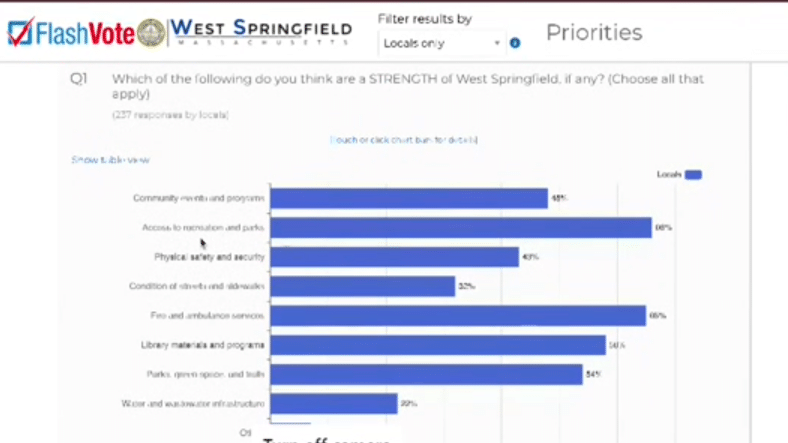An example of the data collected using FlashVote surveys.
Photo credit: Wilbraham Public Access
WILBRAHAM — Brianna Bernache of the Hampden-Wilbraham Partners 4 Youth, an organization that works to reduce substance use among young people, requested the Wilbraham Select Board allocate some of the town’s opioid abatement funding to support the program.
Bernache explained that the organization’s first 10 years in operation were largely funded by a Drug Free Communities grant that the school district received from the federal Centers for Disease Control. That grant is now ending and, as of October 2026, the schools will no longer be able to fund the organization’s mission, Bernache said.
HWP4Y’s operations are also funded by two other federal grants, one for $50,000 and the other for $125,000. These grants are expected to end in 2026. However, Bernache said the Trump administration has proposed cutting the $50,000 grant program. If the legislation is approved, that money would cease to be available on Oct. 1.
Town Administrator Nick Breault said the $35,000 in the opioid abatement account was the result of the first five years of opioid settlement fund disbursement. The funds are required to be used to mitigate opioid use. Bernache said substance prevention education, which is among the approved uses for the funds, is a core focus of the organization and HWP4Y. The organization can tailor its programming to ensure it falls within the funding’s designated uses, she said.
“These funds are not going to save the program, unfortunately,” Breault said. He said the town may want to preserve the account balance to provide programming through the Board of Health if HWP4Y cannot continue its mission. If the Select Board did wish to grant the funding request, Breault suggested not allocating the funding all at once.
Select Board Chair Michael Squindo floated the idea of the organization making do in the current fiscal year. He said the town may have more funding available next year. Bernache acknowledged that a “larger cushion” next year may be “more impactful.”
The board decided to table the allocation until the organization learns more about possible funding cuts.
FlashVote
Jason Reis, representing survey and data analytics company FlashVote, was invited to speak with the board about its service. Reis explained that the company specializes in generating “decision-quality, actionable data” for municipalities by creating one-minute surveys that can be answered by a panel of residents several times per year.
Reis said the traditional methods of gathering community feedback are biased and only attract answers from people interested in the specific topic tackled by traditional surveys. “You’re not getting to that silent majority,” he said.
With FlashVote, people who sign up are sent survey questions that are approved by the town to identify feedback on topics the town is interested in, such as land use and what issues residents think are important. While anyone can answer the surveys, having a panel of respondents that receive all the surveys limits the influence of people who have a particular interest in the specific topic.
Further, the data analysis tools allow the town to filter for local residents, age, gender and other demographics. Reis said understanding that older individuals and women are more likely to answer surveys means FlashVote would over sample from young people and men, reducing sample bias.
Reis said the surveys are open for two days. After the results are collected, panel members receive a copy of the survey results. He said this feedback encourages them to answer more surveys in the future. The company gathers panel members by advertising the program with specific language that attracts users. Reis said the goal is to have between 200 and 600 panel members, allowing for a healthy sample size. It usually takes about two months to generate a panel that large.
Much of the value of FlashVote is in how the panels are created and the type of questions that are asked. For example, Reis said questions should have a trade-off, such as ranking one priority over another, rather than be yes-or-no in nature.
Squindo asked if FlashVote sells the data it collects. Reis said no data is sold, and it is only used for town approved surveys. He also told Squindo that the town would not lose access to survey data it has collected, even if its contract with FlashVote was not renewed.
A three-year contract with the company would cost less than $10,000 annually and include six English-only surveys per year. A one-year contract would cost about $12,000, because the longer contracts have upfront costs waived.
Select Board member Marc Ducey asked if there was a trial basis available, but Reis explained it would be a losing proposition for the company, as much of the company’s work is encouraging people to sign up for the panel, which is done at the beginning of the contract. The board said it will vote on the issue at a future meeting.



